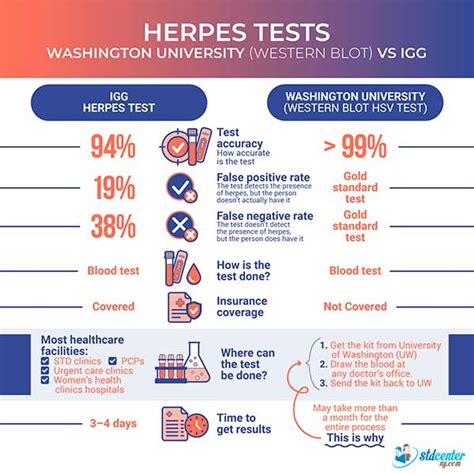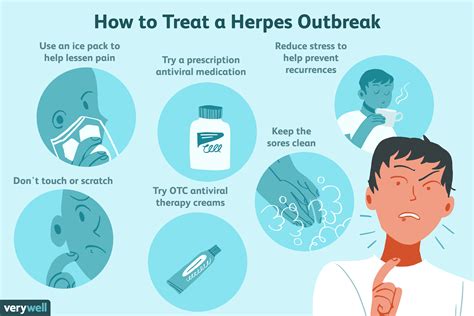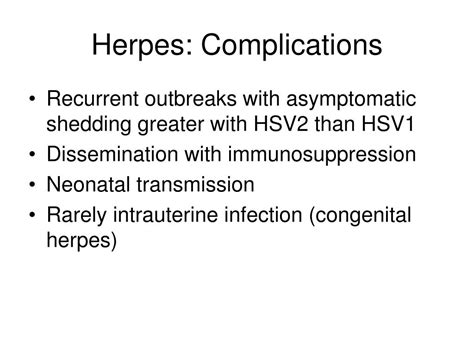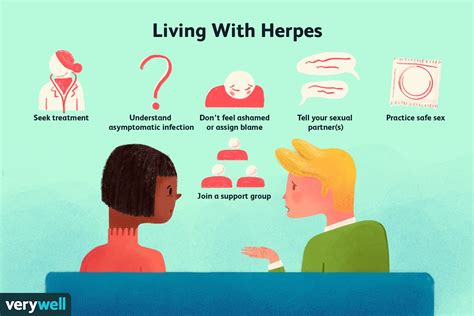Intro
Identify Herpes symptoms, including genital herpes signs, cold sore causes, and STD symptoms. Learn to recognize herpes outbreaks, types, and treatment options to manage the virus effectively.
Herpes is a common viral infection that affects millions of people worldwide. It is caused by the herpes simplex virus (HSV) and can manifest in different parts of the body, including the mouth, genitals, and skin. Recognizing the symptoms of herpes is crucial for seeking medical attention and preventing further complications.
The importance of checking for herpes symptoms cannot be overstated. Early detection and treatment can significantly reduce the severity of the infection and prevent its transmission to others. Moreover, herpes can have serious consequences if left untreated, such as increased risk of acquiring other sexually transmitted infections (STIs) and potentially life-threatening complications like encephalitis.
Understanding the symptoms of herpes is also essential for maintaining good sexual health and preventing the spread of the infection. By being aware of the signs and symptoms of herpes, individuals can take necessary precautions to protect themselves and their partners. This includes practicing safe sex, getting regular STI check-ups, and being open about their sexual history.
What Are the Symptoms of Herpes?

Oral Herpes Symptoms
Oral herpes, also known as cold sores, typically affects the mouth and lips. The symptoms of oral herpes include small, fluid-filled blisters on the lips, mouth, or tongue, pain or itching sensations in the affected area, and swollen lymph nodes in the neck.Genital Herpes Symptoms
Genital herpes affects the genitals, buttocks, and thighs. The symptoms of genital herpes include painful blisters or sores in the genital area, itching, burning, or tingling sensations in the affected area, and swollen lymph nodes in the groin.How to Check for Herpes Symptoms

In some cases, a healthcare provider may order laboratory tests to confirm the diagnosis of herpes. These tests can include blood tests, viral cultures, or polymerase chain reaction (PCR) tests.
Herpes Testing Options
There are several testing options available for herpes, including blood tests, viral cultures, and PCR tests. Blood tests can detect the presence of herpes antibodies in the blood, while viral cultures involve taking a sample of the affected tissue and growing the virus in a laboratory. PCR tests use a sample of the affected tissue to detect the genetic material of the virus.Treatment and Prevention of Herpes

Preventing herpes involves practicing safe sex, getting regular STI check-ups, and being open about your sexual history. Using condoms or dental dams during sex can significantly reduce the risk of transmitting herpes to others.
Herpes Prevention Tips
Here are some tips for preventing herpes: * Practice safe sex by using condoms or dental dams during sex * Get regular STI check-ups * Be open about your sexual history * Avoid sharing personal items, such as towels or utensils * Avoid touching the affected area and then touching other parts of the bodyComplications of Herpes

Neonatal Herpes
Neonatal herpes occurs when a newborn baby contracts herpes from their mother during delivery. This can be a life-threatening condition and requires immediate medical attention.Living with Herpes

Coping with Herpes
Coping with herpes involves seeking emotional support, practicing stress-reducing techniques, and joining support groups.Conclusion and Final Thoughts

If you have any concerns about herpes or would like to learn more about the condition, we encourage you to comment below or share this article with others. Remember, seeking medical attention and practicing safe sex are key to managing herpes and preventing its transmission.
What are the symptoms of herpes?
+The symptoms of herpes include painful blisters or sores, itching, burning, or tingling sensations in the affected area, and swollen lymph nodes.
How is herpes diagnosed?
+Herpes is diagnosed through a combination of physical examination, medical history, and laboratory tests, such as blood tests, viral cultures, or PCR tests.
Can herpes be treated?
+While there is no cure for herpes, treatment options are available to manage the symptoms and prevent further complications, such as antiviral medications and lifestyle changes.
How can I prevent herpes?
+Preventing herpes involves practicing safe sex, getting regular STI check-ups, and being open about your sexual history. Using condoms or dental dams during sex can significantly reduce the risk of transmitting herpes to others.
What are the complications of herpes?
+If left untreated, herpes can lead to serious complications, such as increased risk of acquiring other STIs, encephalitis, and neonatal herpes.
